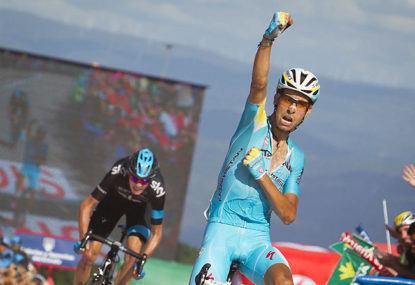Both Astana and Movistar head into the final Grand Tour of the year, the Vuelta a Espana, with many cards to play in terms of the general classification. Is this a blessing or an avoidable complication? It can work both ways.
Astana’s objective was to win the Giro d’Italia with Fabio Aru, but during the gruelling Grand Tour found another candidate to challenge for top spot in Mikel Landa. This created some problems, with each being the favoured rider for the overall at different times of the race.
While it was advantageous in some ways, as it gave Astana a chance to crack Alberto Contador, which he did over the final two stages, it was done in such a disorganised fashion. In the end, it became a unneeded rivalry.
On Stage 4 of the Giro – the first climbing stage of the race – Aru was the highest placed finisher for Astana, with teammate Dario Cataldo with him, while Landa finished 44 seconds further back. That should have been when the decision was made to go all in for Aru, but then on Stage 16, Landa attacked early, took the stage win and also put half a minute into Contador.
What was even more staggering was the fact that Landa also took nearly three minutes on Aru, and as such moved into second place in the general classification, with Aru close behind in third.
Again, at this stage, whoever was in front should have been given team leadership, especially so late in the race.
On Stage 19 though Aru attacked and won the stage, gaining him over a minute on both Landa and Contador. The same thing happened on Stage 20, as Aru won the stage, Landa 30 seconds back, with Contador a further two minutes behind.
Aru ended up finishing two minutes behind Contador in second, one minute ahead of Landa in third.
What does this come down to? Astana, in wanting to attack and isolate Saxo-Tinkoff, in fact isolated and reduced their own chances of winning the pink jersey at the Giro.
Let’s now contrast Astana’s efforts at the Giro with Movistar’s clinical and well thought-out plans at the Tour de France.
Astana at the Giro would have one of their favourites attack and that was really that. The chosen rider on that day would ride for the stage win, take a minute, but the next mountain stage end up faltering.
Movistar on the other hand had one key leader, Nairo Quintana, and one key helper, Alejandro Valverde, who himself could cover for Quintana in the overall classification if something went wrong.
To show the difference between Astana and Movistar, let’s look at Stage 20 of this year’s Tour.
Valverde attacked up both the penultimate climb of the Col de la Croix de Fer and Alpe D’Huez, with Quintana following the move a short time later. Also, up Alp D’Huez, Winner Anacona was waiting in the break to help Quintana, which he did superbly and Quintana took over a minute on Chris Froome.
Movistar’s was a team-based attack, but at Astana, it was a one-out attack in hopes of a stage win, with the thought that they may get some time back on GC. As a result, Astana won five stages at the Giro, but not overall.
If this disjointed riding style occurs again at the Vuelta, there will be problems – three problems in fact. Aru, Landa and Vincenzo Nibali are all scheduled to race, with Aru and Nibali probable joint leaders.
Astana general manager Giuseppe Martinelli spoke at the recent Vuelta a Burgos on the issue.
“We have two or three big riders, I’m not going to name one as the leader,” Martinelli told Cycling Weekly.
“With all three of them, though, we have a team that can take on and beat Quintana or Froome. I expect they will be there for a re-match after the Tour.”
Aru spoke to Gazzetta dello Sport on the move to include Nibali for the Vuelta:
“I spoke to Vincenzo for a long time on the telephone on Thursday. He’s come out of the Tour in good form and his stage win has boosted his moral. He’ll do well at the Vuelta because he one of a few great riders in the peloton.
“We’re professionals, we know how to work responsibly and we know the rules in the team. We’ve got an excellent relationship even if we haven’t raced together for a long time, apart from the world championships, since the 2013 Giro d’Italia.”
Will this ‘team’ Martinelli alluded to ride as just that, or a bunch of individuals, as we saw at the Giro? Time will tell.
Ultimately, there will come a point at the Vuelta where one rider will need to be given the nod as the team leader. Let’s hope this leadership is not as shady as it was at the Giro.






























































































